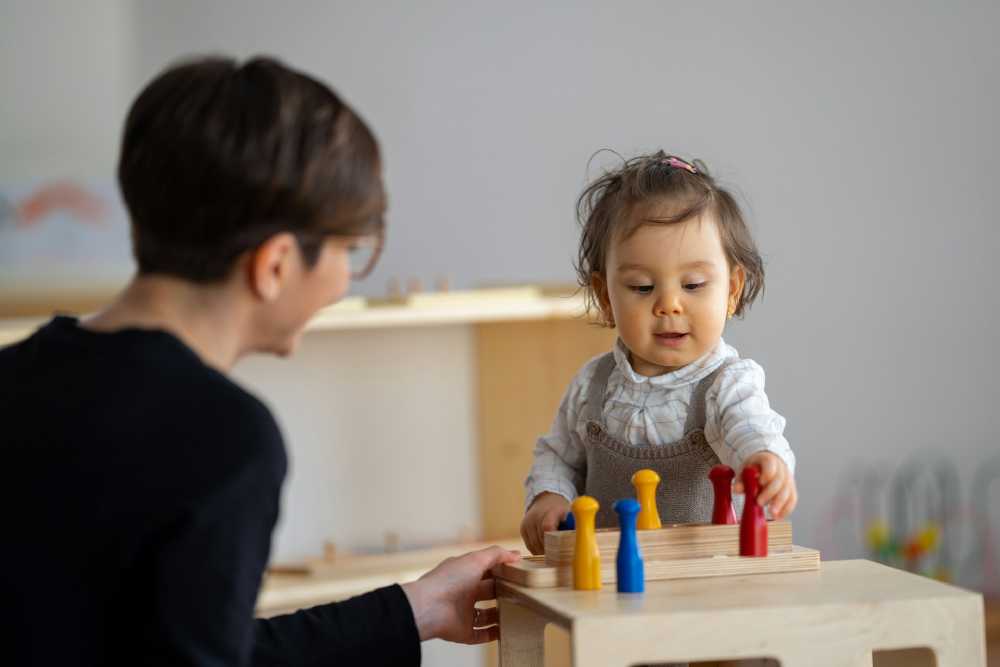Montessori education is an innovative educational approach that emphasizes hands-on learning, self-directed activity, and collaborative play. It’s based on the research of Dr. Maria Montessori, who believed that children learn best in environments that allow them to explore and discover at their own pace. In various settings, like Spanish speaking day care, these principles can be applied to foster language skills alongside independence.
The method is child-centered, encouraging students to take charge of their learning through engaging, interactive activities. Unlike traditional educational systems that often follow a strict curriculum, the Montessori method allows children to follow their interests and learn through real-life experiences. Montessori classrooms are often filled with natural light and organized into areas dedicated to different subjects, each tailored to the developmental stages of the child’s age group.
Contents
Core Principles of the Montessori Method
The Montessori method is built around several key principles:
- Respect for the Child: Recognizing and respecting each child’s individuality and developmental pace. This principle posits that children have an intrinsic motivation to learn and that they should be given the freedom to do so in a supportive environment.
- Prepared Environment: Creating an environment optimized for independent learning and exploration. Resources and materials are arranged logically and accessible to allow children to engage with them freely. These environments are designed to be aesthetically pleasing and to inspire curiosity.
- Auto-Education: Leveraging the child’s innate curiosity and ability to educate themselves through purposeful activities. The Montessori method provides tools and guidance while allowing children to discover answers on their own, fostering a deep understanding and mastery of subjects.
Encouraging Independence in Children
One of the foundational goals of Montessori education is to foster independence. This is achieved by offering choices and responsibilities that match the child’s capabilities, enabling them to learn at their own pace. In a Montessori classroom, children may choose their activities and work independently or in small groups. This autonomy reinforces their confidence and decision-making skills.
The environment itself is designed to support independence. Materials are arranged to be within reach, and activities are structured to allow children to complete tasks on their own. Educators act as guides, providing support when needed but primarily allowing the child to lead their learning journey.
In such settings, children develop essential life skills like problem-solving, time management, and self-discipline. For instance, when children are given opportunities to make decisions, such as selecting which puzzle to complete, they learn to trust their judgment and capabilities.
Moreover, the Montessori method integrates responsibilities that might typically be handled by adults. Children take part in daily tasks such as setting up snacks, cleaning their work areas, or helping peers with activities. These practices emphasize the importance of contributing to the community and foster a sense of responsibility and reliability from a young age.
Real-Life Benefits of Montessori Education
Parents and educators often notice significant benefits from Montessori education. These include improved social skills, advanced problem-solving abilities, and higher levels of academic performance. Montessori students typically exhibit an enduring love for learning, which can follow them into higher education and beyond.
Research has demonstrated that children in Montessori programs often show better behavioral and academic outcomes. For example, a study by the Centers for Disease Control and Prevention (CDC)highlighted these improvements, particularly in the areas of social cognition and academic achievement.
These findings suggest that the Montessori method supports educational development and overall child well-being. Additional studies have shown that Montessori-educated children can excel in standardized tests and show better adaptability in diverse social situations.
Furthermore, Montessori students are often more emotionally intelligent, displaying empathy and effective communication skills. Since the Montessori environment encourages collaborative play and peer teaching, children learn to value others’ contributions and understand diverse perspectives.
Implementing Montessori Practices at Home
Integrating Montessori principles at home can be a rewarding experience for both children and parents. Start by creating a structured yet flexible environment that encourages independence. Simple strategies include organizing toys and educational materials at a child’s eye level and allowing them to choose their activities.
Parents can also adopt Montessori-based discipline methods that focus on positive reinforcement and problem-solving rather than punishment. This approach helps children learn self-regulation and consider the consequences of their actions in a supportive and respectful environment. Additionally, practical life activities—such as cooking, cleaning, and gardening—are excellent ways to involve children in meaningful tasks that build their skills and confidence.
Engaging children in daily chores such as setting the table or sorting laundry can help develop a sense of responsibility. Moreover, setting up a child-friendly kitchen or workspace where kids can engage in tasks safely can encourage their autonomy and self-sufficiency. By integrating these practices into daily life, parents can help their children thrive in a Montessori-inspired setting.
The Montessori approach can also be applied to guiding children’s media consumption. Rather than passively consuming content, children can be encouraged to engage in more interactive and educational activities that promote critical thinking and creativity. Additionally, setting aside specific times for screen use and family activities can help children develop a balanced routine.
Conclusion
Montessori education offers a holistic approach to learning that nurtures a child’s natural curiosity and fosters lifelong skills. Montessori methods can significantly contribute to a child’s independent growth and overall development, whether applied in formal education settings or at home.
By embracing these principles, parents and educators can provide children with the tools they need to become confident, capable, and curious individuals. Ultimately, the Montessori approach aims to equip children not only with academic knowledge but also with the skills necessary to navigate life’s challenges independently and with confidence.



